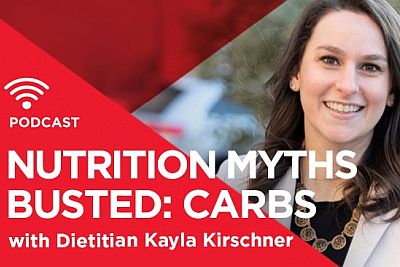When it comes to losing weight, chances are you’ve come across some wildly conflicting advice.
With thousands of fads and “tips” circulating on Tik Tok and in other corners of the internet, it’s harder than ever to separate myth from fact. At every turn, someone has advice for shedding pounds. Unfortunately, a lot of what you’ve heard about weight loss is likely misleading or false.

Kelli Wood, MS, RD LDN
Here with the help of Dietitian Kelli Wood, MS, RD LDN, we separate fact from fiction, and share what really works—based on the latest scientific research, not internet trends.
Before we dive into myths vs. proven strategies for losing weight, it’s important to acknowledge that achieving and maintaining a healthy weight is not easy for most people. Weight loss success is not just a matter of will power.
Even in the new era of powerful weight loss medications, losing weight and keeping it off often requires permanent, life-long changes. And before beginning any weight loss plan, it’s important to discuss the options with a health care professional.
The Myths
Myth #1: Skipping Meals Helps You Lose Weight
 Reality: If you think you can easily achieve long term weight loss by cutting out a breakfast, lunch, or dinner, think again. Skipping meals can do more harm than good.
Reality: If you think you can easily achieve long term weight loss by cutting out a breakfast, lunch, or dinner, think again. Skipping meals can do more harm than good.
When you skip meals, your blood sugar takes a nosedive, leaving you sluggish or moody. And going for too many hours without eating can cause overeating at the next meal. Kelli warns that this can lead to a dangerous cycle of yo-yo dieting.
“The roller-coaster of up and down weight loss can alter your metabolism (the efficiency with which your body burns calories), making losing weight even more difficult to achieve,” she notes.
Of course, there are times when life gets so busy we can’t always eat regular meals every day. Kelli recommends keeping a wholesome snack on hand for those days when you’re on-the-go and having a complete meal just isn’t possible.
“Have a healthy snack such as trail mix (nuts and unsweetened dried fruit) or sliced veggies and hummus on hand. This way you’ll be able to fuel your body even on the most hectic days when you just have to miss a meal,” she says.
Myth #2: All Calories Are Equal
Reality: Not all calories are created equal. The source of calories matters for overall health and weight management. Nutrient-dense foods like fruits, vegetables, lean proteins, and healthy fats provide essential vitamins and minerals, promoting a healthier body, while empty calories from sugary snacks, desserts, and some highly processed foods can lack nutritional value. They may fill you up temporarily, but you won’t be getting the nutrition your body needs and in the case of sugary snacks, you’re likely to feel hungry again soon after eating.
Decades of research points to fiber and protein as effective in helping you feel full. Meals that include protein and are high in fiber (think whole grains such as whole wheat, quinoa, fruits and vegetables, and lean sources of protein like fish, tofu, and skinless poultry) will help to fill you up and reduce the likelihood of overeating throughout the day.
Kelli urges people to focus on the quality of food, and not overthink calories.
“If you’re eating a diet rich in fresh, wholesome foods, you’re more likely to feel satisfied without having to stress as much about calories or portion sizes,” she says.
Myth #3: Exercise Alone Guarantees Weight Loss
 Reality: Exercise alone is not the most effective strategy for significant weight loss. While regular physical activity is crucial for overall health and can contribute to weight management, it is challenging to burn enough calories through exercise alone to create a substantial calorie deficit for significant weight loss.
Reality: Exercise alone is not the most effective strategy for significant weight loss. While regular physical activity is crucial for overall health and can contribute to weight management, it is challenging to burn enough calories through exercise alone to create a substantial calorie deficit for significant weight loss.
The amount of exercise required to burn a high number of calories can be quite demanding, especially for those who are overweight or obese. What’s more, Kelli highlights that exercise can increase appetite for some, leading to increased consumption that offsets the calories burned during exercise.
“You may end up eating more calories than you burn by just focusing on exercise alone,” she says, adding: “You’ll also need to refuel your body with nourishing post workout meals or snacks. It’s important to prioritize both what you eat and how much you move for successful weight loss and maintenance.”
Research shows that dietary changes play a more significant role in weight loss than exercise alone.
For optimal weight loss results, Kelli says, “a comprehensive approach that combines regular exercise with a nutrient dense, calorie-appropriate diet and other lifestyle modifications, such as stress management and adequate sleep, is what works.”
Myth #4: Crash Diets Guarantee Results
Reality: While it’s tempting to look to crash diets as a solution to weight loss, they rarely provide a realistic eating plan for lasting success. Crash diets may result in rapid weight loss initially, but most often, the loss comes from water weight and muscle mass, not just fat.
Many crash diets advocate eliminating dozens of foods, and in some cases limiting entire macronutrient groups (like carbohydrates or fats) to levels that are not sustainable. Most quick-fix fads that promote fasting or deprivation for long periods are not realistic for most people, and they may result in overeating once the fast is complete.
The better way? A comprehensive approach that prioritizes long-term, livable habits over quick fixes.
“Rather than thinking in terms of ‘diet’, which can lead to feelings of deprivation, consider a focus on nutrient-rich, wholesome foods for your meals and snacks—foods that you’ll enjoy and that will supply the nutrition that your body needs,” says Kelli.
Choosing a wide variety of nutritious foods, including fruits, vegetables, whole grains, lean protein, and heart-healthy oils, in combination with consistent physical activity, can yield sustainable weight loss success.
Myth #5: Carbohydrates are the Culprit
 Reality: Carbs are not the enemy; they are the body’s go-to source for energy. The key is to choose complex carbohydrates like whole grains, fruits, and vegetables while avoiding too many refined grain options and sugary snacks and desserts.
Reality: Carbs are not the enemy; they are the body’s go-to source for energy. The key is to choose complex carbohydrates like whole grains, fruits, and vegetables while avoiding too many refined grain options and sugary snacks and desserts.
“Fewer carbs do not necessarily translate into weight loss,” says Kelli. She adds, “What’s more important is the type of carbohydrate you choose.”
Complex carbs provide sustained energy and essential nutrients, supporting your overall health and weight loss goals.
For some people, limiting carbs (to less than 15% – 20% of total calories) can even cause fatigue, headaches, and other negative side effects.

Learn more about carbs in our podcast.
Kelli also stresses the importance of carbs that are rich in fiber. She notes, “Fiber helps keep you feeling full for longer and is found in fruits, vegetables, beans, legumes, and whole grains. Aim for 25-30 grams of fiber per day for the most benefit.”
While cutting carbs is not necessary to lose weight, some people prefer to limit the amount of carbs they eat because it helps them feel better overall. The best diet for you is one that you can sustain for the long term and that enables you to become healthier.
For more on carb myths and facts, check out our podcast.
Before beginning a low carbohydrate diet, just like any weight loss plan, it’s important to discuss the options with a health care professional.
Myth 6: Weight Loss Is a Matter of Willpower Alone
Reality: Weight loss is not just a matter of willpower. Losing weight and keeping it off in the long term is a complex physiological and psychological process influenced by many factors, including genetics, metabolism, hormone levels, and environmental factors.
“A strong will alone is not enough to overcome the powerful biological mechanisms that regulate appetite, energy expenditure, and fat storage. Your brain and metabolism, in most cases, will overpower your will, no matter how strong it may be,” Kelli says.
There are also other factors, such as stress (which can cause emotional eating) and limited access to healthy food options. These too, can undermine even the most conscientious dieter.
Successful and sustainable weight loss typically requires a balanced approach that combines a healthy diet, regular physical activity, stress management, and addressing underlying medical or psychological issues.
“Rather than going it alone with just willpower on your side, you’ll raise your chances of success by seeking support from friends and family, healthcare professionals, nutritionists, and mental health experts, Kelli emphasizes.”
Myth #7: New Weight Loss Medications Are a Magic Bullet
 Reality: The past few years have witnessed groundbreaking advancements in the treatment of obesity, with novel weight-loss medications now taking center stage in the battle to shed pounds.
Reality: The past few years have witnessed groundbreaking advancements in the treatment of obesity, with novel weight-loss medications now taking center stage in the battle to shed pounds.
Drugs like Ozempic, Wegovy, Mounjaro, and Zepbound have gained considerable attention for their remarkable efficacy in promoting weight loss. These medications work by slowing the process of digestion and reducing appetite and are typically administered through weekly injections. So far, the success rates of these new drugs are impressive; however, we are still in the early stages of understanding all the potential risks and benefits.
There is little doubt that these are pioneering medications. However, they are not a cure-all for everyone.
First, there is the problem of cost: Most of the newer weight loss drugs cost more than $1,000 per month. In addition, some people experience unpleasant side effects and the potential of needing to stay on the medications long term.
So, if you are considering starting a medication for weight loss, it’s important that you speak with your healthcare practitioner. For some people, weight loss drugs may be a valuable tool, but they are not a substitute for the balanced and holistic approach necessary for lasting weight management success.
Note: Since everyone’s health history and nutritional needs are so different, please make sure that you talk with your doctor and a registered dietitian to get advice about the diet and exercise plan that‘s right for you.

